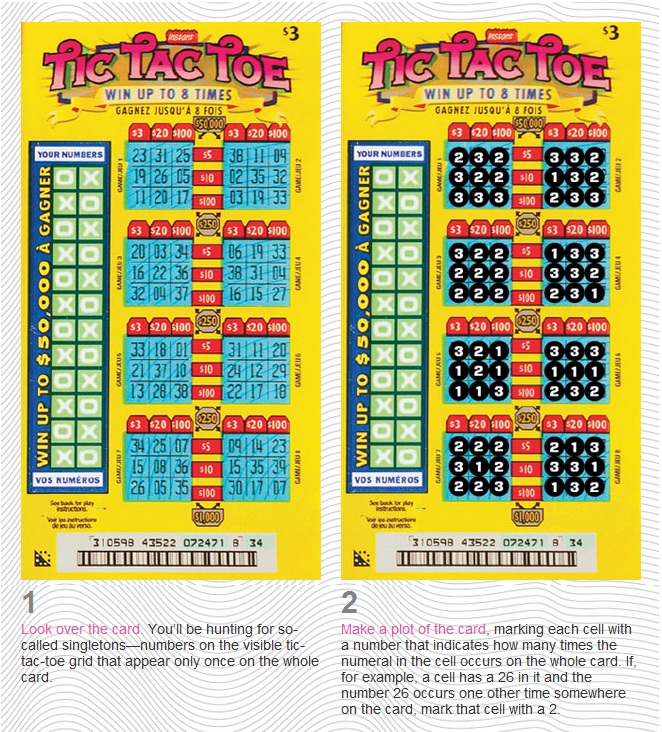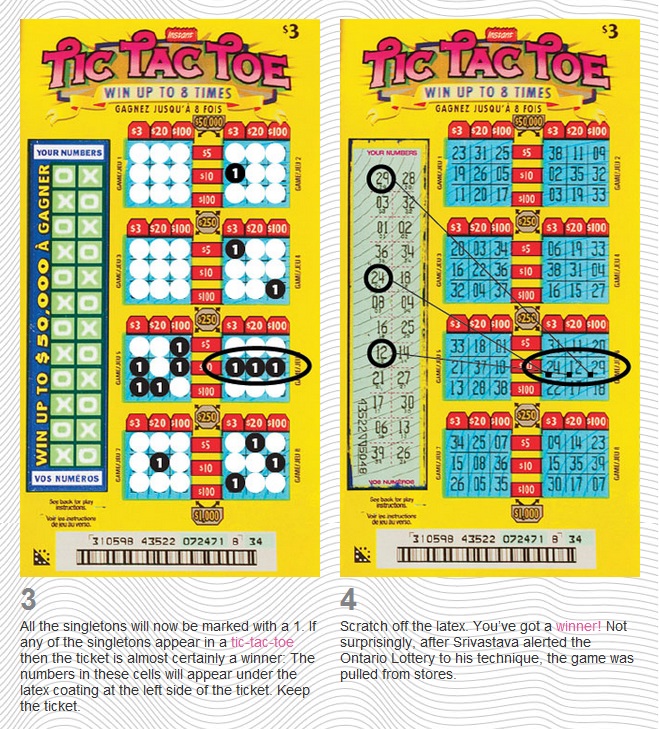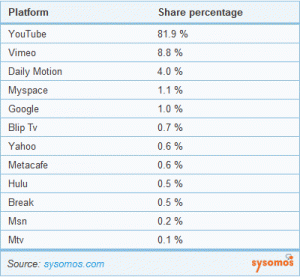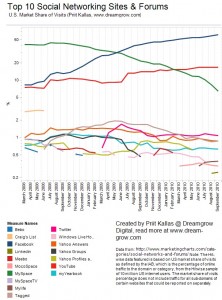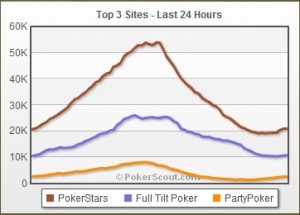I’m going to be in China on vacation for the next two weeks if anyone has recommendations on what to do or see that would be great. I’m going to be in Taipai, Nanjing and Beijing. I’ll try and post some pics when I get back!
It is 2 minutes and 4 seconds in length and has nothing to do with poker. I hope you like it.
Read a pretty awesome article on cracking the lottery from wired.com a couple weeks ago. It’s a bit lengthy but worth a read if you’re interested in having a go at becoming a professional lotto scratcher. I would not be surprised one bit if there are still some lottos out there that are beatable run by people who are either ignorant or apathetic about ensuring the “integrity” of the lottery.
Before you go out and buy yourself 100s of lottery tickets I will summarize for you how it’s done:
The entire system hinges on a couple of things.
1. You must have a method of getting rid of unscratched tickets. The majority of these will be losers so good luck. Some stores apparently let you return unscratched tickets. If you can’t get rid of them by returning them, you would have to find a way to resell them on some secondary lotto ticket market. This is somewhat difficult and may in fact be illegal though it’s pretty unlikely any authorities are going to bother enforcing it. Ebay forbids resale of lotto tickets so you can not use them.
2. You must be able to predict whether an unscratched ticket is a winner or not with a greater than non random chance. This is obviously the hard part and is what you are wondering. Well Mohan Srivastava first discovered how to do this way back in 2003 and has done so a number of times since using a variation of his singleton method. This image from page 3 of the wired.com article explains it nicely.
Good luck and happy scratching! I take no responsibility for any money you waste buying lotto tix and failing to make this strategy work btw.
Part 1 of an 11 part video with running time of ~90 minutes. Michael Larson figured out how to beat the game show “Press Your Luck” that was supposed to be completely random but wasn’t. He got away with it as nothing he did was illegal and ended up walking away with 110k in 1984 for his efforts.
Check out my business’ website at http://www.effortlessatms.com I haven’t really talked about my ATM Machine business at all lately and wanted to wait til I got my website up to give any sort of update. Things have been going pretty slow and steady for me. I currently have 7 locations with a verbal agreement to put an 8th in next month that should do the equivalent volume of all my current locations combined. I’ve been in business about 18 months now and am just now starting to make consistent revenues that maybe a college kid could live off of. I’m still unprofitable, and because I plan to keep expanding it will be at least another year before I do finally turn profit depending on how much new business I generate.
The new website has been about six weeks in the making and I’m happy it’s finally launched and live. It set me back a fair bit, but in the long term I think it will definitely be worth it. I’m still in the process of setting up Adwords and optimizing it. I’m still fairly new to using them, but I’ve depleted most of the other lead generating methods I had tried up to now. In case your curious they have included:
-Craigslist Advertising (mildly successful)
-Cold Call (I usually only do this to gather info, and then follow up with an in person meeting)
-Door to door (extremely time consuming, better to call first, pretty hit or miss)
-Cold e-mail (zero success with this method)
-Postcard campaign (only did this once with 1000 and received exactly 1 phone call which did not lead to a sale)
-References (once you get a few sales, this is far and away the BEST and EASIEST way to get new business)
-Acquisitions (I’ve made a couple offers to buy already placed ATMs, but either been too slow to act or other people have bid higher)
So check me out online I appreciate any/all support I can get!
Why do Full Tilt and Poker Stars have a monopoly on the poker site market? In my last post I talked about how poker sites are not maximizing their revenue effectively. Now I would like to address all the haters saying how it’s not fair that there’s very little legitimate competition between poker sites and how the players are getting price gauged by the few sites with all the market share because of the high cost and legal barriers to enter the market. Well I have news for you all.
This is how the internet works. Just about every single online company that is successful at an international level has a complete stranglehold on their market.
Just think, where do you go for search engines? 86% of the world goes to google.
Where do you go for internet browsers? 80% of the world goes to internet explorer or firefox.
Where do you go for an operating system? 90% of the world goes to windows.
Where do you go for video sharing? 90% of the world goes to youtube or vimeo.
Where do you go for social networking? 90% of the world goes to facebook (graph is a bit misleading as it lists twitter and youtube as social networking competitors)
Where do you go for online poker? 90% of the world goes to Pokerstars or FullTilt
Where do you go for online books? Amazon. Where do you go for online auctions? Ebay. Where do you go for online money transfers? Paypal. Where do you go for online video rentals? Netflix. I could go on and on.
In all of these markets 90% of the world market goes to one or two companies for that service. Before you start getting all depressed and angry about how we’re being price gouged left and right by all these monopoly internet companies the good news is just because a certain company is at the top now does not mean they will remain there. Netscape used to be the market leader in online browsers. Yahoo used to be the market leader in search engines. Myspace used to be the leader in social networking. Partypoker used to be the market leader in online poker. Products inevitably get better over time. If they don’t, a competitor’s product does and the original company dies. Online poker is still in it’s infancy and will no doubt get better with time, but complaining about lack of competition is to be ignorant of how the internet works.
I’ve spent the last week creating a new free poker web tool in my spare time which you can check out at PokerBluffTools.com The essence of the site is three calculators which will determine whether bluffs and calls are profitable or not and how profitable or unprofitable they may be. The calculators will be most useful to you if you use them in conjunction with an equity and range calculator such as pokerstove or propokertools.com, however they can still be useful on their own as a standalone product.
The main motivation I had for creating this tool was to save myself(and you) time and energy doing tedious algebra work that goes along with calculating the expected value or fold equity of hands. You may remember my post on Preflop Math Well using the calculators I have created, you can do this much easier and quicker yourself, except you can also solve for a number of other unknowns like finding the breakeven bluff amount, expected $$ won of a play, how large the potsize must be for a bet to be profitable etc. It is also not limited to just preflop plays. Using the calculators you can quickly and easily calculate whether semibluff raising a flushdraw, or two overs is a good play or how large a bet you can call with a draw and no implied odds.
I hope you find it useful. I would appreciate any and all suggestions and comments for the tool. If you think it’s a piece of crap I’d like to know that too. Please just let me know why you think this and how it can be improved. If someone is interested in partnering in some way making drastic improvements to the tool to try to turn this into a commercially viable product I am interested, and if anyone wants to advertise on the site please send me an e-mail at PokerBluffTools@gmail.com
A month or so I was browsing the internet looking at tax brackets (why? I dunno probably because I have entirely too much time on my hands) and came across this Laffer-Curve.
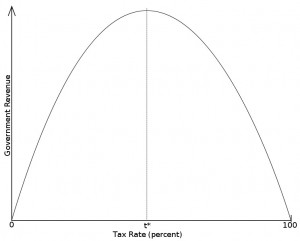
You can read more about it on wikipedia here. The gist of the curve is that it shows graphically how to maximize tax revenue for a state. Intuitively you might think that a state maximizes their revenue by implementing an extremely high tax rate, but it turns out this is not true. If the state charged a 99% tax rate what motivation would anyone have to work? Same goes for 90% or 80%. What about charging a super low rate? After all if you only charged 1% everyone would work REALLY hard because all the money they make they get to keep right? Well, you can only make up for the lower % in so much increase in volume so surely you can agree that the ideal tax rate to maximize revenue for the state is somewhere in the middle between 20-70%. All right that’s all good and all you might say, but where am I going with this and why do you care?
Well you can replace everything I said in the last paragraph about “state” with “online poker casino” aka Full Tilt and Stars if you live in the US and everything I said about “tax rate” with “rake” and it suddenly all becomes extremely relevant. Check out the following graph.
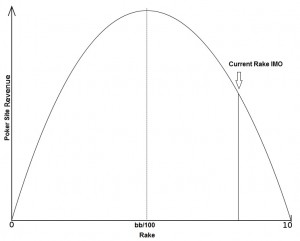
If online poker sites really want to maximize their revenue they should lower their rake in my opinion. Last month I made about $1k for myself and paid poker sites over $3k in rake. It completely destroys my motivation to grind. Why should I go grind 40 hours a week when for 30 of those 40 hours I’m just making someone else rich? As a result, the games die and people quit playing. There are tons of other grinders out there just like me. Now clearly the way for the sites to maximize their revenue is not to dramatically drop how much they are charging their customers down to $100/month like some people suggest or whatever, but it’s clearly not to completely gouge their customers til they’re broke or lose all motivation to play either. Their current rake system is completely unsustainable and is killing the games.
I realize the US Department of Justice is partially to blame for seizing player funds, which account for huge losses to the sites, but they can’t just continue to increase rake indefinitely and expect to still have a growing market either. Maybe they don’t care and just want to make as much as they can short term as they know Harrah’s or MGM will ultimately overtake them in the market in the years to come and are perfectly okay with killing off 90% of their customers, but if they are smart they will realize this is not good business for them.
I’ve seen all sorts of complaints about the rake and personal anecdotes, I merely wished to give a sound economical argument for why the rake is too high in the interests of the gaming and poker site operators. An argument which to date, I have seen no one effectively make.
Notice the backup QB saying “Did you just…” as the camera pans away.
First off I want to thank everyone who left comments for me on my last post. I guess I’ll keep up the blogging after all.
A couple of weeks ago I applied for what was basically a part time book keeping job for a one man operation hedge fund. The manager was kind enough to reply and say it wouldn’t be a good fit as I should be looking for a back office position with my background and not a front office. I knew this of course, but thought it would be a good way to get into the business and work my way up. He agreed to meet me for lunch anyways and what follows is some of the career advice he had for me.
This may be a blessing in disguise because if I had decided to quit playing poker when I was 30 I’d be totally dead and completely unemployable by 90% of employers. Before he said this I thought, oh I got my degree it’s no big deal if poker ever falls through I can always go get an entry level job if I have to. WRONG. Nobody wants to hire a 30 or 35 year old guy with no professional work experience. Employers can’t see the potential in you anymore. You’re more expensive, less flexible and just a lot more risky of a hire than the same guy 10 years younger. One of the best things I have going for me entering the job market now is my youth. So let this be a warning to other pros out there, the clock is ticking on your career. If you don’t plan to play poker for the next 30 years, you better be winning a lot now, potentially winning a lot in the near future, or start planning your exit from the game as it could really be damaging to your lifetime earnings potential to stay in the game too long.
I have no skills (in respect to working for a hedge fund). He said going to work for a hedge fund is a place where people go to leverage skills they learned elsewhere. While I disagree with him that I have no useful skills (I have experience gambling and losing money, as well as being much more knowledgeable than your avg joe about the stock market imo as I’ve read the WSJ for 4+ years now) both of which are extremely applicable to working for a hedgefund. Regardless, it was good to hear his perspective and what perspective other people in his position would likely have of me.
His advice was to go take an excel class and market myself as an “Excel GURU” or go read some brokerage trading reports, and then spend a couple of months coming up with my own and marketing it to hedge funds. He also recommended working on getting a CFA. If you’re interested in getting into finance and currently play poker, this is something you can work on and study for part time. Believe me, it’s a lot more productive than browsing 2+2 all day. You could also work on your programming skills as a ton of trading is done completely by software written by guys hired by hedge funds these days.
Move. Seattle isn’t exactly the mecca of the finance world. Chicago, NY and San Francisco is pretty much where it’s all at in the US if you want to work in the industry. This just isn’t something I’m willing to do however.
He had the following two book recommendations.
I read Reminiscences of a Stock Operator a couple years ago and blogged briefly about it here. Upon his recommendation, I promptly went to the library and checked out Stock Market Wizards. The book, which has been revised and rewritten every five years or so with different interviewees, is a series of interviews with the current most successful hedge fund managers on Wall Street. It is definitely worth a read if trading is something you’re interested in. Much like poker players, each money manager has a different approach and trading philosophy, but some common themes do emerge after you read enough of them.
What I was most amazed about was how many of them are one man operations. I guess I just assumed most hedge funds were huge companies with 100s of employees, but what I am slowly learning is there a tons of small operation hedge funds out there just like the guy I had lunch with. In fact, before anyone with any real money would be willing to invest with you, you have to develop a track record of a couple years trading with your own and your friends and family’s money. A lot of the interviewees in the book talked about how they didn’t like to be influenced by other people’s opinions, so they either stopped talking to them or got rid of them or spunoff on their own. The typical successful one has been doing it for 10 years, works long hours and never misses a trading day for any reason. One guy in particular said how he didn’t like working 12 hour days, or doing research on Sunday night before the market opens on Monday, but if he didn’t he knew he wouldn’t be successful. He works hard because he has to. If he didn’t he may lose money, or fall behind everyone else.
In the end I realized trading and working for a hedge fund has a lot of things in common with poker which I hate. It can be extremely isolating and antisocial, it’s stressful, it’s swingy, and you don’t really have that much control whether you win or lose you just have to strive to make the best decisions possible and hope to get lucky. Sure you can make a lot of money doing it, but I came to the conclusion that I don’t think it’s something I wish to do like I thought I did. I don’t think I want it bad enough. Even if I were to succeed do I really want to spend 80 hours a week staring at a computer screen by myself with very little social interaction. Even if you do well, all your clients will still have the “yeah, but what have you done for me lately?” attitude.
One interviewee in the book talked about how he made 50% on his portfolio in early January and just sat on cash for the next three months because he didn’t see any good trading opportunities and obviously it’s less risky to have less market exposure, but his clients start to get antsy and angry with him that he’s not making trades for them. He makes them 50% in three months which is just about as good as you can possibly do and his clients are still unhappy with him. Seems pretty lose lose to me.
I know a lot of poker players out there think trading for a living would be a good fit for them, but before you make that leap make sure you do your research and know what you’re getting into. I’m sure glad I did.
I remember a couple years ago every other day you’d see a post of people asking “should I make the leap and become a professional poker player?” or “I finally did it! I’m a professional poker player!” Well, you don’t see many people talking about going the other direction back to becoming an amateur. Most likely this is because when most people do they inevitably went busto and couldn’t cut it anymore. Well, in my case I still have a decent amount of savings built up and I think I still have an edge against most PLAYERS in the games I play, however, the fact is that’s just not enough these days. In light of the recent legal developments, it’s tough for me to get enough tables going sometimes, and even when I do the rake is just so high it’s not even worth it. There’s also all sorts of deposit, withdrawal issues, the poker economy is dying and I don’t really see it booming any time in the near future and for me at this point it’s just best that I move on from poker and go get a job. Sure, I could move, I could go play live, I could mass table grind and squeak out $40k this year, but the fact is it’s just not worth it. There are more important things to me in my life right now than maintaining my profession as a poker player and I’ve started sending out my resume.
One of the things that I think appealed to my blog from the beginning is I’ve always been very open about posting results where as most people only post their winning streaks or complain about their bad runs. Well November, I lost $1,700 and December I made $1,000. In December I actually put in a decent amount of volume and tried to stick it out at .5/1, but after I got up $4k or so the mixed games proved too tempting and I ended up losing this hand during my “shot taking.” This was about 3x as big as any other pot I played for the whole month. I don’t post it to show how bad I run, but post it to show my lack of discipline in being able to grind out the low stakes for a steady profit. I think this has been a major flaw of mine throughout my poker career, but also perhaps major driver in some of my success. If you’d like to learn from my mistakes I would summarize as follows:
a) If you are concerned with making the most money possible as a professional poker player, I would recommend being relatively conservative with your bankroll and never playing at stakes with under 100 buyins. Be extremely selective with your game selection and try to only play people really bad at poker.
b) If you are less concerned with maximizing your hourly and making the most money possible from poker, but more interested in making decent money, pushing yourself to your limits and becoming the best poker player you can be then be aggressive with your shot taking. Play in some tough games, improve as much as possible, spend a lot of time studying the game and see how far it will take you.
I clearly selected b) and don’t regret it one bit. I know what I am and where I fall in the poker food chain. I’ve played David Benyamine in headsup 7 game and beat him. I’ve bought significant action against Gus Hansen in a nosebleed stud8 game. I played the main event on my own stake. I view these as accomplishments of mine, but clearly if you select a) you do not care about such things. You would simply look at the EV and variance of any one of these things and conclude it’s not worth the risk.
Anyways, enough poker. I’d like to talk about what’s next for me. You may be wondering what kind of job I’m looking for. Well, one thing’s for sure, I’m super glad I got my degree and didn’t drop out or “take a semester off” for poker like I considered back in the college days. At first I thought I wanted to get a job in the finance world and ultimately with a hedge fund trading and speculating on stocks all day. Well I ended up meeting with a hedge fund manager who just moved out to Seattle for lunch and he had some pretty decent career advice for me which you may also find helpful which I’ll talk about next time.
PS I have a couple 2010 wrap up blogs in mind and what I have planned for 2011, but beyond that please leave a comment if you are still interested in me blogging after I get a job. I mean how interesting is I grinded 40 hours a week all four weeks this month and made exactly what I thought I would! I’m actually looking forward to this now haha. I’m more than happy to keep it up, but blogging is somewhat time consuming and obv I will try to keep it interesting, but it’s pretty understandable if poker players are no longer interested in hearing from a guy with typical day job.
